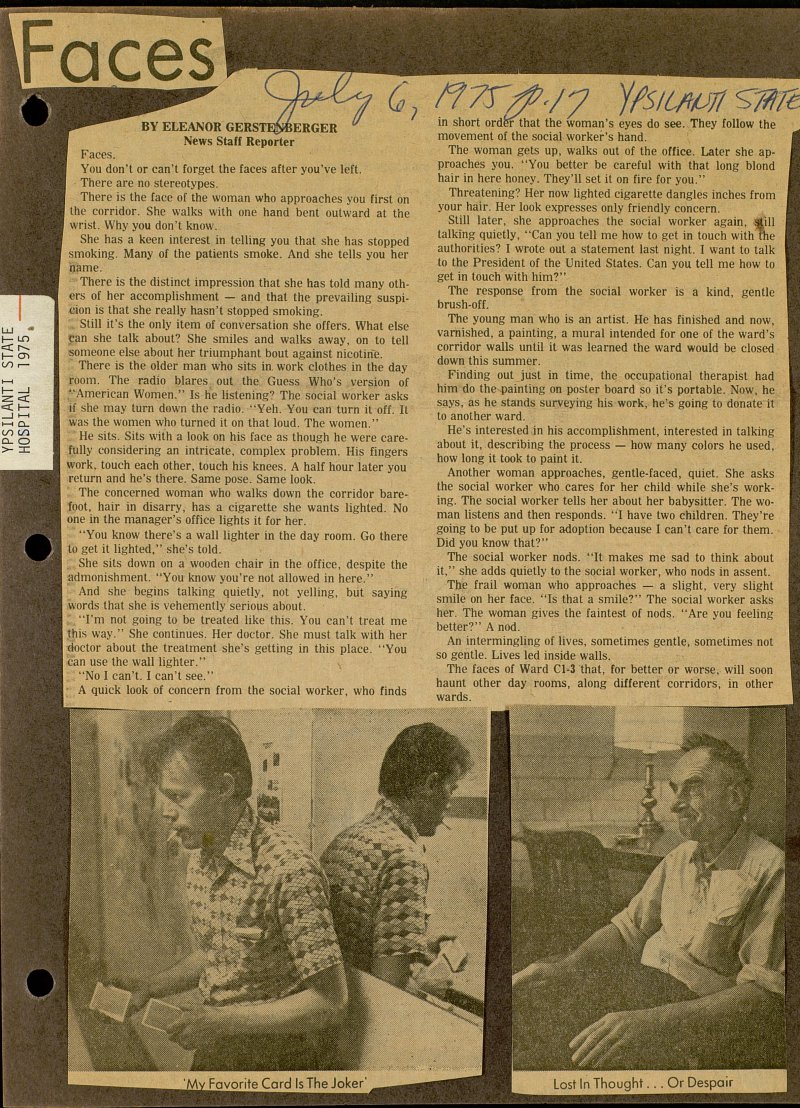Faces


Faces. You don't or can't forget the faces after you've left. I There are no stereotypes. There is the face of the woman who approaches you first on I the corridor. She walks with one hand bent outward at the I wrist. Why you don't know. I She has a keen interest in telling you that she has stopped smoking. Many of the patients smoke. And she tells you her name. There is the distinct impression that she has told many others of her accomplishment - and that the prevailing suspicion is that she really hasn't stopped smoking. Still it's the only item of conversation she offers. What else can she talk about? She smiles and walks away, on to tell someone else about her triumphant bout against nicotine. There is the older man who sits in. work clothes in the day room. The radio blares out the Guess Who's version of 'American Women." Is he listening? The social worker asks she may turn down the radio. "Yeh. You can turn it off. It was the women who turned it on that loud. The women." He sits. Sits with a look on his face as though he were carefully considering an intricate, complex problem. His fingers work, touch each other, touch his knees. A half hour later you return and he's there. Same pose. Same look. The concerned woman who walks down the corridor barefoot, hair in disarry, has a cigarette she wants lighted. No one in the manager's office lights it for her. "You know there's a wall lighter in the day room. Go there to get it lighted," she's told. She sits down on a wooden chair in the office, despite the admonishment. "You know you're not allowed in here." And she begins talking quietly, not yelling, büt saying I words that she is vehemenüy serious about. "I'm not going to be treated like this. You can't treat me I this way." She continúes. Her doctor. She must talk with her I doctor about the treatment she's getting in this place. "You I can use the wall lighter." "No I can't. I can't see." A quick look of concern f rom the social worker, who finds in short order that the woman's eyes do see. They follow the movement of the social workef's hand. I The woman gets up, walks out of the office. Later she J proaches you. "You better be careful with that long blond j hair in here honey. They'll set it on fire for you." I Threatening? Her now lighted cigarette dangles inches from I your hair. Her look expresses only friendly concern. I Still later, she approaches the social worker again, $ill I talking quietly, "Can you teil me how to get in touch with ttie I authorities? I wrote out a statement last night. I want to talk I to the President of the United States. Can you teil me how to I get in touch with him?" The response from the social worker is a kind, gentle brush-off. The young man who is an artist. He has finished and now, varnished, a painting, a mural intended for one of the ward's I corridor walls until it was learned the ward would be closed ] down this summer. Finding out just in time, the occupational therapist had him do the painting on poster board so it's portable. Now, he says, as he stands surveying his work, he's going to dónate it to another ward. He's interested in his accomplishment, interested in talking about it, describing the process - how many colors he used, how long it took to paint it. Another woman approaches, gentle-faced, quiet. She asks I the social worker who cares for her child while she's working. The social worker tells her about her babysitter. The woman listens and then responds. "I have two children. They're going to be put up for adoption because I can't care for them. Did you know that?" The social worker nods. "It makes me sad to think about it," she adds quietly to the social worker, who nods in assent. Thie frail woman who approaches - a slight, very slight smile on her face. "Is that a smile?" The social worker asks her. The woman gives the faintest of nods. "Are you feeling better?" A nod. An intermingling of lives, sometimes gentle, sometimes not so gentle. Lives led inside walls. The faces of Ward Cl-3 that, for better or worse, will soon I haunt other day rooms, along different corridors, in other wards.